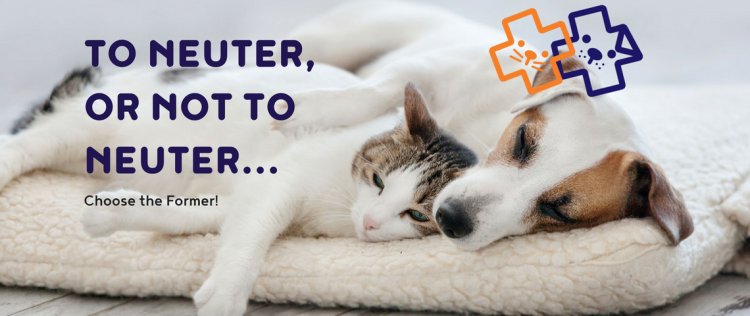
Neutering –
also sometimes referred to as spaying in females, or castration in males – is a common
surgical procedure that is performed on perhaps a daily basis in veterinary practice, and has become
an important part of responsible pet ownership. In male cats and dogs, the operation involves
removing the testicles, and in females, it is the ovaries and uterus.
So why do we neuter? The primary reason most people neuter their pets is to prevent unwanted
pregnancies. While this is indeed a great reason to neuter, there are many other benefits associated
with it.
The boys first!
When we neuter a tom cat or male dog, their testosterone levels decrease, reducing
negative behavioural traits such as aggression, inappropriate urination, straying and territorial
marking. The risk of male-specific cancers are reduced . Males can no longer mate with
females, therefore helping to reduce Ireland's current overpopulation problem.
Did you know that in just seven years, one unspayed queen and her descendants can produce
420,000 kittens?! It can be difficult to keep cats contained, with many of them free to roam the
streets as they please. Spaying queens helps to curb the feral cat issue, and also reduces the risk of
them developing cancerous mammary tumours. This same affliction also affects female dogs.
Spaying bitches also erases the chance of developing a deadly disease called pyometra; a build-up
of pus in the uterus that results in a very sick animal requiring a costly, emergency spay to save their
life!
Okay, you're convinced, now what? First thing's first: call any of our clinics to book in for a preneuter check. Your vet will perform a full clinical exam to ensure that your pet is suitable for
surgery. Most cats can be neutered from 4 months of age, but it is a little different for dogs.
Depending on their breed, the ideal age to neuter males or females is anywhere between 6 and 18
months, with large breed dogs at the latter end of the scale as musculoskeletal and other
developmental disorders may occur as a result of premature neutering.
On the day of the surgery, your pet comes into us in the morning fasted from the night before. They
will stay with us for the day and are usually discharged between 5-6pm that evening. The first thing
that we do is run pre-anaesthetic blood tests, if you wish for that to be carried out. This test
measures your pet's liver and kidney function to ensure that their organs are capable of metabolising
and excreting the anaesthetic drugs normally. They then get an injection of 'pre-med' which makes
them sleepy and reduces anxiety before inducing a general anaesthetic. Your pet's vital signs are
monitored by a qualified, registered veterinary nurse throughout the whole procedure and also
during the recovery period. We let them sleep off the anaesthetic drugs for a few hours, then they go
home with pain relief. Post-operative checks are also included in the cost of the neuter, so we ensure
that they are right as rain at the end of it all!
If you are on the Pet Health Plan, you can avail of a 20% discount on the operation between now
and the end of June, as we believe that neutering is an essential element of good pet health care.
If you want to discuss neutering, call any of our clinics and a staff member will answer any
questions you have. Looking forward to your next visit!




